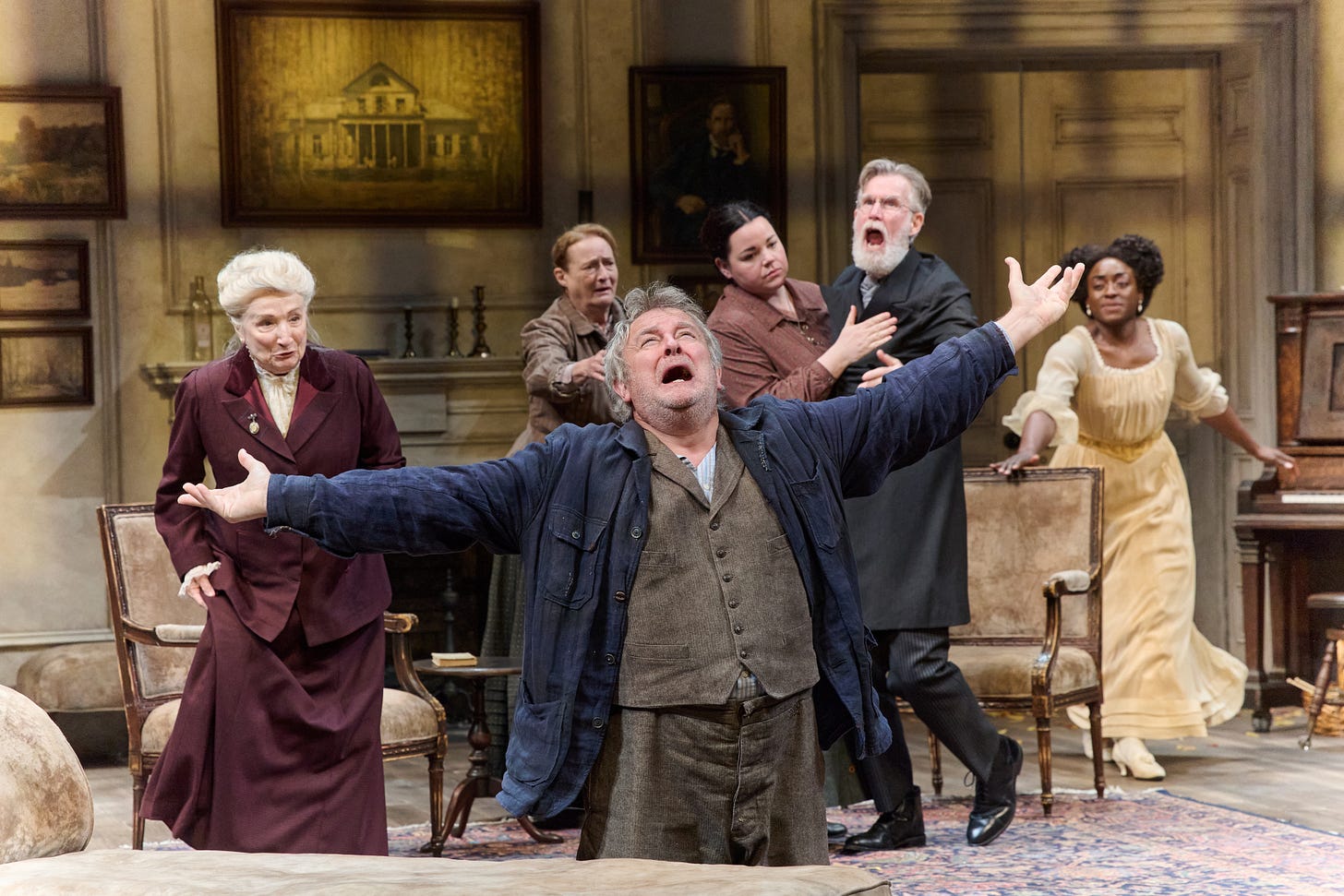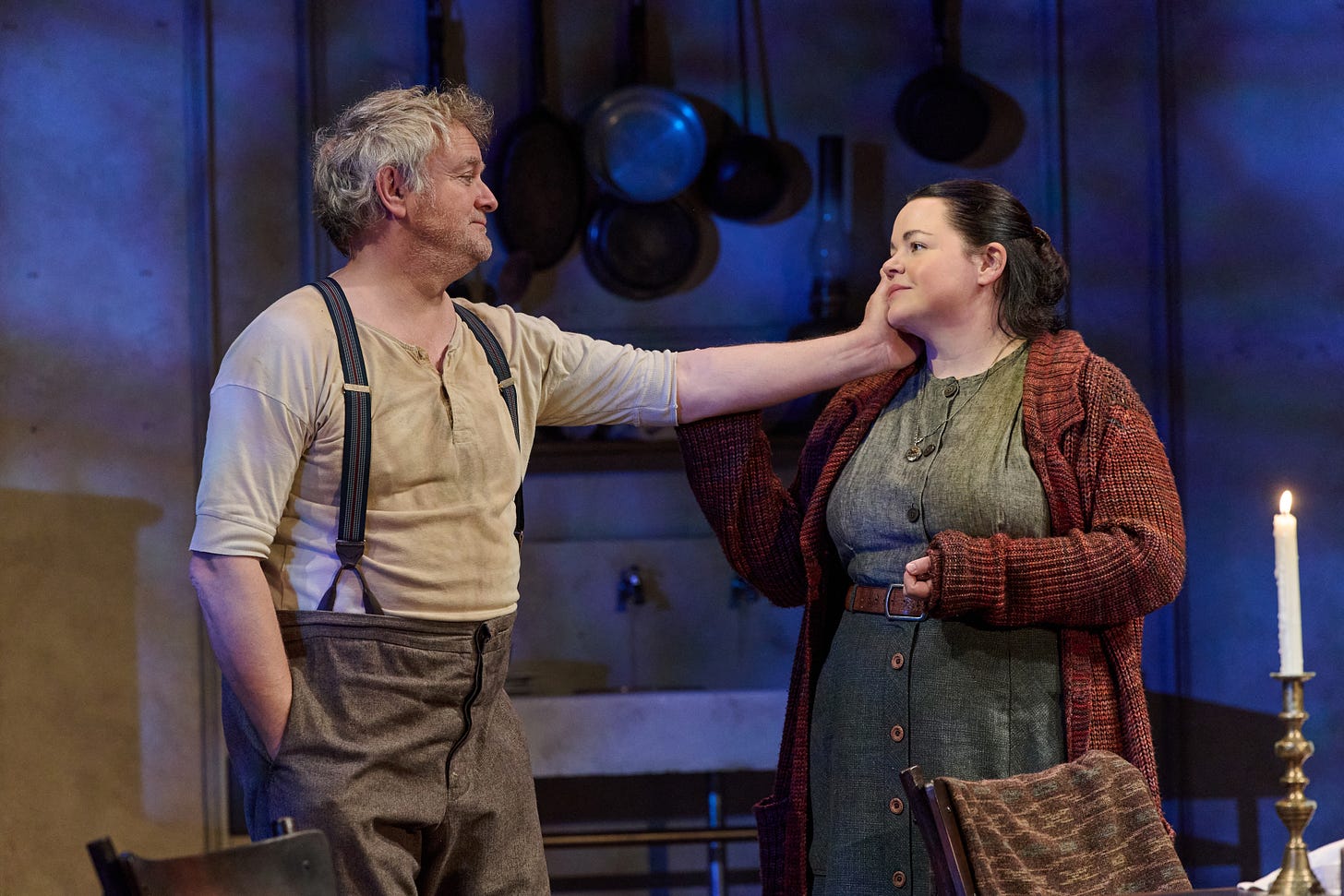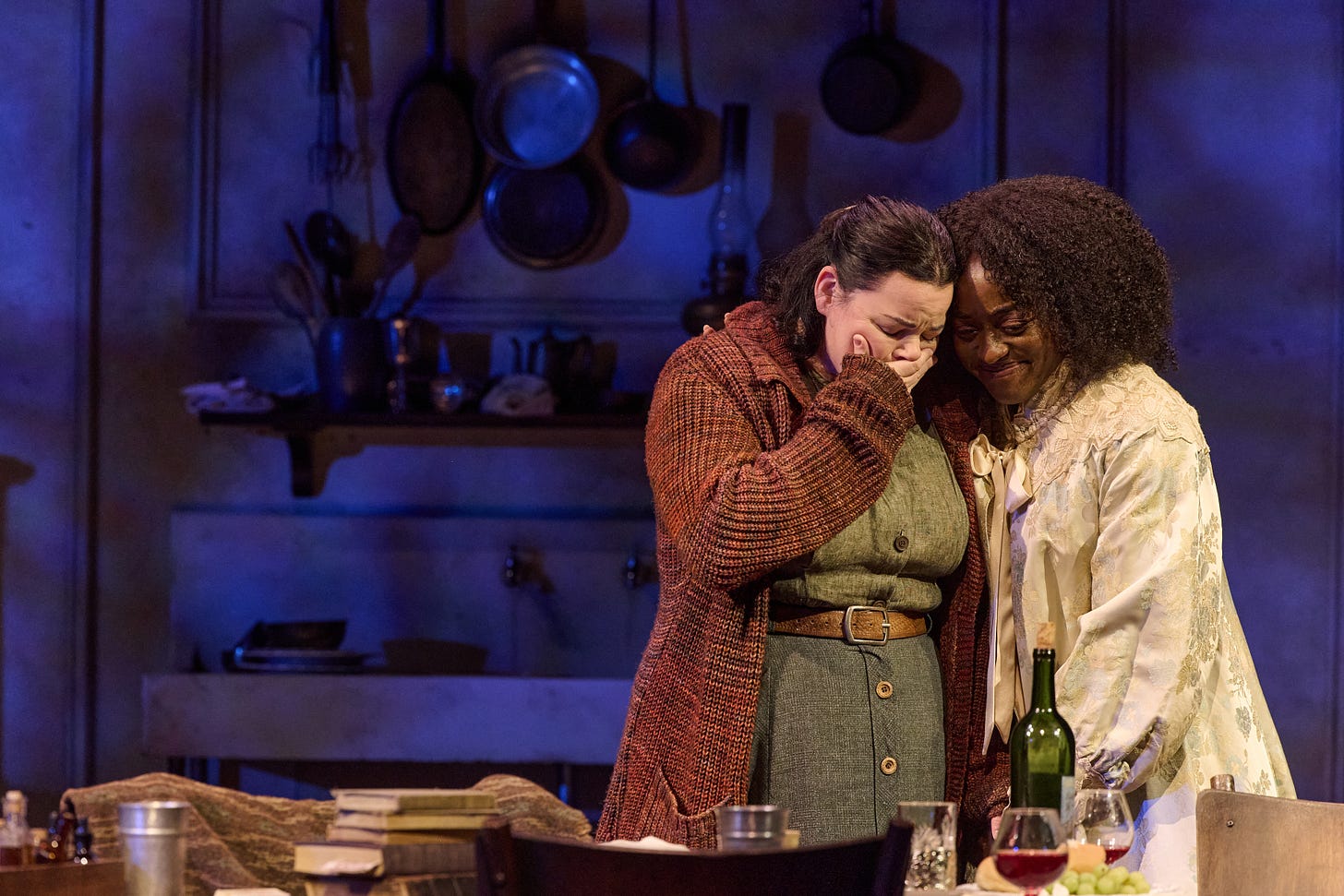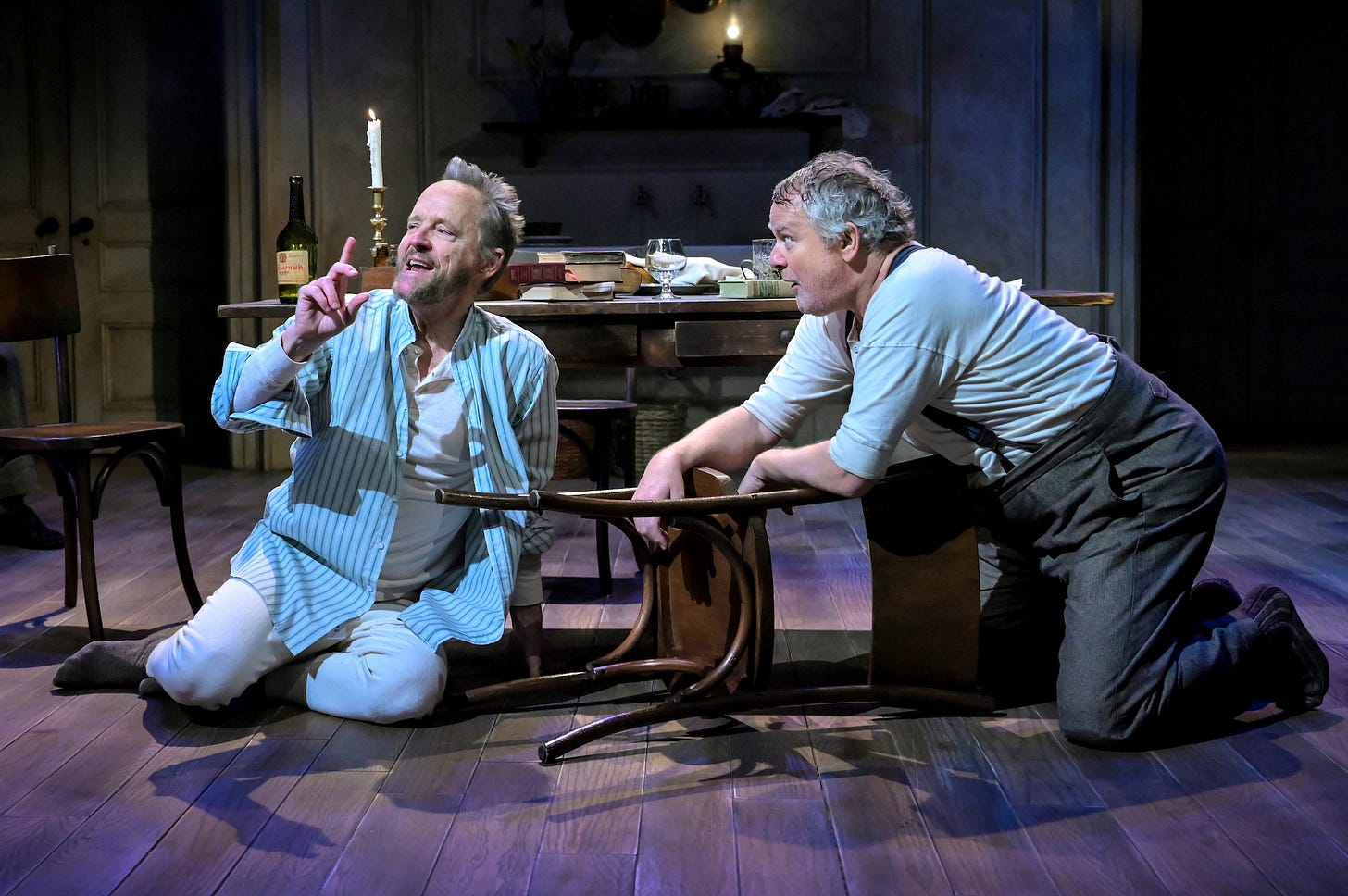[The cast of of Uncle Vanya at Shakespeare Theatre Company. Photo by DJ Corey Photography.]
As I sat in a packed auditorium earlier this week—watching Chekhov’s Uncle Vanya unfold on stage at The Shakespeare Theatre in Washington, D.C.—I kept thinking about empathy. It might seem counterintuitive, because when we think about the theatre, we’re generally thinking entertainment. Or edification. But in my experience, live theatre is also one of the best opportunities to experience empathy for strangers.
Think about it: you’re sitting in this crowded auditorium, surrounded by people you don’t know, watching actors on stage (who you probably also don’t know) who are pretending to be fictional characters (more people you don’t know) and are speaking lines written by a playwright (who is probably also a person you don’t know). And this entire exercise is intended to make us laugh, cry, gasp, have any number of unexpected, in-the-moment, spontaneous emotional reactions. And unlike almost any other form of entertainment, we’re in this experience together from beginning to end. The lights are down. Our phones are off.
Watching live theatre, we’re quieter and more attentive than we would be at a movie, a concert, or a ballgame, and definitely more than if we were watching something on TV. All these factors create a special environment. Like we exist together, cast, crew, and audience, in a pocket dimension where the story on stage is everything to us. It’s an opportunity to really see other people. To listen. To pay attention. To find common ground.
This new production of Uncle Vanya, starring British film and television star Hugh Bonneville, is on stage through April 20 following a run at the Berkeley Repertory Theatre in California. The play was adapted by Conor McPherson and directed by Simon Godwin, who is also the artistic director for The Shakespeare Theatre. They’ve put on a tight, well-crafted, well-oiled production in which every element is working. It was a pleasure to sit in the audience and drink this classic story in.
[Hugh Bonneville and Melanie Field in Uncle Vanya at Shakespeare Theatre Company. Photo by DJ Corey Photography.]
Uncle Vanya is a play that seems simple on the surface, taking place entirely at a crumbling estate in the Russian countryside and featuring an ensemble of nine actors. The owner of the estate, Professor Alexandre Serebrykov (Tom Nelis), and his beautiful, much younger second wife (Yelena) are visiting from the city and unwittingly disrupting the lives of everyone who lives in the home year-round. Vanya (Bonneville), the brother of the professor’s first wife, manages the estate with the help of Sonya (Melanie Field), the professor’s sweet, kind, level-headed daughter. But Vanya also spent most of his life assisting with the professor’s academic work. He put this intellectual, learned man up on a pedestal and convinced himself that his (Vanya’s) life would have meaning because he was assisting with such important academic. Now the professor is old and retired, his work never amounted to much, and Vanya, middle-aged, feels like his own life has been wasted.
Hugh Bonneville, who you might know from Downton Abbey or his many film and television roles, anchors Uncle Vanya’s strong ensemble, but I was also impressed with Melanie Field, who does a lot with a more subdued role, and John Benjamin Hickey, who plays Mikhail Astrov, a friend of the family and physician going through his own mid-life crisis. Astrov is obsessed with vanishing forests and changes to the environment, speaking about humanity’s devastation of nature in a way that is strikingly modern, seeming to foreshadow our current climate crisis.
Like Chekhov’s other great works, Uncle Vanya is a complex tapestry of little moments that are alternatingly mundane and profound, ordinary and strange. Somehow, this play is always simple and always complex at the same time. While so many little nothings are happening, so much something is happening below the surface of this story and then bursting through at key intervals as a character loses his or her temper. Musing about the kind of theatre he desired, Chekhov once said, “A play ought to be written in which people come and go, dine, talk of the weather, or play cards . . . because that is what happens in real life. Life on the stage should be as it really is and the people, too, should be as they are and not stilted.” Chekhov was obsessed with the little moments, and I think that’s what made him such a poet of the the human condition.
[Melanie Field and Ito Aghyere in Uncle Vanya at Shakespeare Theatre Company. Photo by DJ Corey Photography.]
Anton Chekhov died in 1904 at the age of 44, after a long battle with tuberculosis. His father was born a serf, and he lived in the twilight of Russia’s imperial state, but his writing is remarkably modern. It feels almost contemporary. Perhaps because he purposely avoided fancy language or elevated prose, attempting instead to have his characters speak like real people, whether they were on stage or in a short story.
There have been disagreements about which genre Chekhov’s plays fit into, ever since he wrote them over a century ago. Are they comedies? Are they tragedies? Are they something else? The Shakespeare Theatre describes Uncle Vanya as a “heartbreaking comedy,” which seems fairly accurate, but I think this work actually defies genre. It doesn’t fit neatly into comedy or tragedy or even drama because the playwright was trying to capture on stage what it feels like to be alive.
Anton Chekhov wasn’t writing about larger-than-life characters (who tend to populate tragedies) or smaller-than-life characters (who tend to populate comedies). Instead, he tried to depict people. As close to real, ordinary people as he could. This might seem like an obvious enough thing to do now, but it was a pretty radical idea in theatre at the turn of the twentieth century. In fact, I would argue that many contemporary dramas that are grounded in realistic depictions of human behavior and include elements of comedy, drama, and tragedy in the same work—particularly on screen—are rooted in the narrative principles Chekhov was developing 120-odd years ago. I’m thinking here of television series like Seinfeld, The Office, Parks and Rec, or the works of filmmakers like Noah Baumbach and Greta Gerwig. But there are countless other examples.
When asked about his literary influences, Tennessee Williams once said: “What writers influenced me as a young man? Chekhov! As a dramatist? Chekhov! As a story writer? Chekhov!” Novelist and essayist Francine Prose echoed this sentiment when she wrote, “Read Chekhov, read the stories straight through. Admit that you understand nothing of life, nothing of what you see. Then go out and look at the world.”
On stage in Uncle Vanya we get no heroes or villains, and no overall moral message. The professor is the closest figure to a villain, but really he’s just a crotchety old man who’s uncomfortable in his aging body and bad at reading the room. He lacks compassion, but like most unpleasant people in real life, he isn’t evil. His greatest sin is that he isn’t special. He isn’t the hero that Vanya and others imagined him to be be.
And yet the play is not presenting a nihilistic worldview, or that Vanya is wrong to wish for something more from the professor or even himself. The play is also not presenting a pessimistic worldview. There’s a lot of sadness. These characters are awash in regret and the stains of time. But they are consequential. They may be simply ordinary humans, but they matter.
Chekhov seems to be telling us that it is consequential to live a human life, even if we cannot understand the greater meaning of our lives. Bonneville’s Vanya is uncouth and angry, making us laugh and cringe, but there’s also a sweetness to him, a purity in his belief that he was meant to have a better life and that he should have some grand purpose. Hickey’s Doctor Astrov is philosophical and humane, but we also see the pain and prickles lurking below his surface. I was particularly impressed with Melanie Field’s Sonya, who is at once hopeful and resigned, demure and intense. A lesser actor wouldn’t have gotten as much out of this peace-making character. This is a strong cast all around, and their work is aided by set design, lighting, sound, music, and choreography that all work together, seamlessly. The result is life unfolding on stage, sometimes melancholy, sometimes laugh-out-loud funny, but always full of heart and consequence. It was a wonderful night at the theatre.
[John Benjamin Hickey and Hugh Bonneville in Uncle Vanya. Photo by Kevin Berne/Berkeley Repertory Theatre.]
Uncle Vanya is on stage through April 20 at The Shakespeare Theatre’s Harman Hall, located at 610 F Street NW, Washington, DC 20004. Runtime is two hours and thirty minutes with an intermission. Tickets can be purchased online or by calling the box office at 202-547-1122. [Content transparency: This production includes haze, flashing lights, gunshots, and glass breaking, as well as coarse language and depictions of alcohol consumption.]
If you’re not in the area or just looking for something you can watch at home, The Shakespeare Theatre recommends three Vanya-related films—Vanya on 42nd Street (1994), Drive My Car (2021), and Vanya (2023, 2025). And if you’re looking for something to read, Hugh Bonneville has a recent memoir out, Playing Under the Piano: From Darkest Downton to Darkest Peru (2022).







